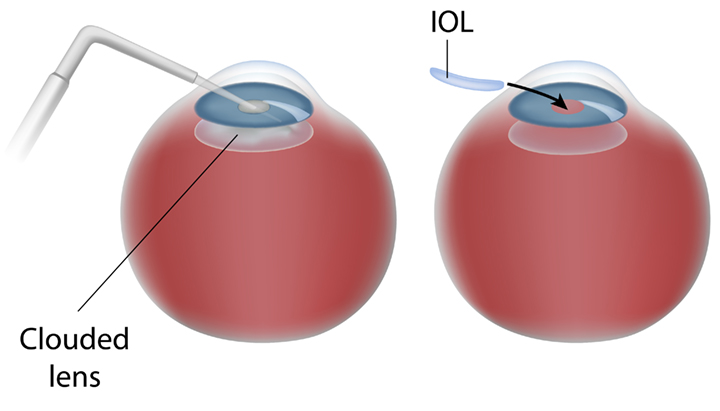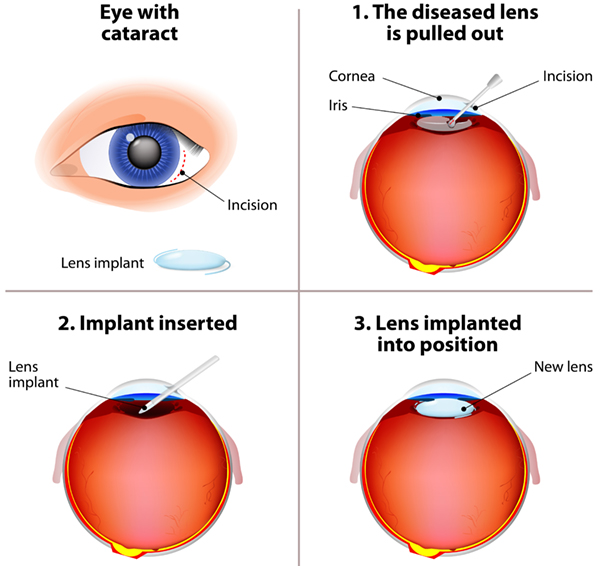Cataract Surgery

Vision changes are normal. But you can turn back time.
Cataracts are a natural part of the aging process within the eye that can cause blurry vision, among many other bothersome visual symptoms. Cataract surgery at Hayden Vision can restore your vision and improve your quality of life.
What Are Cataracts?
Cataracts are a very common age-related eye condition and happen to everyone as they age. As your eyes age, the proteins inside of the lens begin to break down and clump together, causing it to become cloudy.
When the eye’s lens becomes cloudy, it will result in a range of bothersome visual symptoms such as blurred vision, double vision, halos and starbursts around lights, difficulty driving at night, light sensitivity, and dulling or washing out of colors. If left untreated, cataracts can lead to blindness.
While age is the most common cause of cataracts, injury, certain medications, and conditions, such as diabetes, can also trigger cataracts to develop earlier in life. The gradual progression of cataracts can result in compromised vision without you even realizing it until symptoms such as sensitivity to light, near accidents while driving, or difficulty navigating steps or curbs occur.
However, you do not have to live with diminished vision caused by cataracts! Cataract surgery can reverse the effects of cataracts and restore vision to the crispness and clarity of earlier years.
Advanced lens implants can even correct astigmatism and provide a fuller range of near and mid-range vision, reducing dependence on glasses. With over thirty years of experience, training, and commitment to surgical excellence, you can trust that you are in good hands with the cataract surgeons at Hayden Vision!
Improving Precision in Cataract Surgery

Cataract surgery requires twenty-four distinct steps by Dr. Hayden, to ensure you get the best possible outcome. A femtosecond laser helps with three of the most critical steps: making the initial incision in the eye, accessing the capsule where the cataract is, and breaking up the cataractous lens. This laser can also be used to create arcuate incisions to correct astigmatism, a more accurate method than previously performed by hand.
Dr. Hayden often uses the computer-assisted laser system to provide the most precise and accurate circular opening, which will always be more uniform in shape than what can be done manually. After the circular opening is made, the laser will be used to fragment the lens. A traditional cataract surgery uses an ultrasound instrument for this purpose. Dr. Hayden will advise you whether the precision of the laser is preferred, based on the anatomical access to your eye, and the sensitivity of lens placement based on the implant you’ve chosen. Laser cataract surgery is not always required, but can improve the precision of certain parts of the surgery, and possibly provide better safety in some situations.
What Happens During Cataract Surgery?

At Hayden vision, our cataract surgeons perform cataract surgery at either an outpatient surgery center or a hospital. The procedure typically takes about two hours, after which you can return home to rest and recover.
To ensure that his patients have optimal visual results after cataract surgery, the cataract surgeons at Hayden Vision follow a meticulous process that involves twenty-four distinct steps. Before starting the procedure, your cataract surgeon will numb the surface of your eyes with eye drops.
You will also be under twilight sedation to ensure you are as comfortable as possible. Next, they will make a small incision in your cornea, which is the clear front surface of your eye, in order to access your natural lens where the cataract is.
Then, your cataract surgeon will use a small ultrasound instrument to break apart the cataract and remove it from your eye. To aid in the critical stages of making the initial incision and breaking up the natural lens, your cataract surgeon will use a special laser called a femtosecond laser.
Next, they will insert a permanent intraocular lens (IOL) to restore your vision to a clearer and sharper state. Once the new lens is in place and positioned properly, the procedure will be complete.
The tiny opening on your cornea does not require stitches or patches, and you can typically resume most of your normal activities the very next day. Many people notice an improvement in their vision right away.
However, it may take a few weeks for your eyes to adjust to the new lens and to experience the full results of the procedure.
Take Our Cataract Surgery Self-Test
What IOL Options Are Available at Hayden Vision?
Advancements in lens implant technology have brought about new options for those undergoing cataract surgery to improve their vision. The choice of lens implant is highly personalized, as every individual uses their vision differently.
During your cataract evaluation, your eye doctor will help you consider your lifestyle and how you use your vision, such as while driving, reading, and using the computer during the day and at night. This will help them match you with the ideal lens implant for your needs.
You may prefer a standard monofocal lens implant if distance vision is your top priority or a multifocal lens implant if you want to see better at a fuller range of distances without glasses. Alternatively, you may opt for a toric lens implant if you have astigmatism, as it can correct it precisely during surgery.
Lens implant choice is not one-size-fits-all, and no two people use their vision in the same way. Your eye doctor will consider all available implant options and help you make the best decision to match your needs.
At Hayden Vision, our cataract surgeons offer a range of IOL choices to align with various vision goals, budgets, and lifestyles.
Presbyopia-Correcting IOLs
IOLs that correct presbyopia are designed to provide the widest range of vision possible without glasses. These lenses are designed to provide vision that is most similar to what you experienced in your mid-thirties.
If you choose this type of lens, you will be able to significantly reduce your dependence on visual aids after cataract surgery. You should only require glasses for specific, limited activities.
Since these implants correct presbyopia, an age-related condition that begins to cause blurry near vision around age forty, there is an additional cost for these lenses. Choosing an advanced-technology IOL that offers a broader range of vision is considered an elective procedure and typically requires an out-of-pocket expense.
However, many people who desire greater visual freedom believe the extra cost is worth the result.
Astigmatism-Correcting IOLs
Astigmatism is a condition where the cornea at the first of the eye is not round, resembling a football rather than a basketball. When removing a cataract, it’s necessary to correct astigmatism as well, as it causes blurred vision at all distances.
With an astigmatism-correcting lens, also called a toric lens, the visual symptoms caused by both cataracts and astigmatism can be corrected in one procedure. During your cataract evaluation, your eye doctor at Hayden Vision will recommend a toric IOL if they believe it will produce a better visual outcome.
Monofocal Lens IOLs
The monofocal lens implant can enhance distance vision, as well as night vision and overall clarity of vision. However, it will not improve near or intermediate vision.
When choosing a monofocal IOL, you will have improved distance vision but will still require glasses for certain activities like reading or using the computer. Medicare and most private insurance usually cover monofocal IOLs, making it the cheaper option.
This option is recommended for individuals who don’t mind wearing glasses for near and intermediate tasks.
Are You Experiencing Cataract Symptoms?
Schedule a cataract evaluation at Hayden Vision in Evansville, IN, today!

